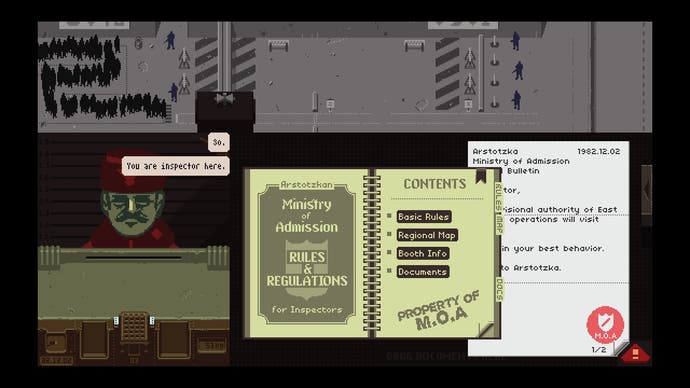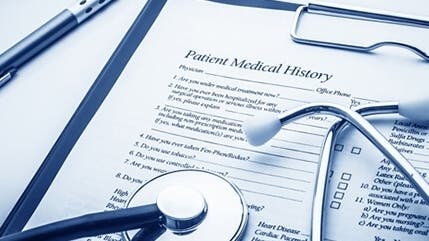Someone should make a game about: Checking medical records in A&E
Do no harm.
Sometimes I well up a bit whilst watching 24-hours in A&E, which I never do during my actual, real-life job in A&E. The settings and stories are all familiar, but here they're framed from afar and from after: with montage and music and they survived?! surprises. The nose starts sniffling and the eyes start prickling and now: warm tears in front of the telly, now something's happening between me and the screen that doesn't happen between me and a patient.
An A&E consultant once told me that the emotion of a case could catch up to him later, unexpectedly. You're casually recounting something in the kitchen - I don't think it has to be the kitchen - and suddenly out of nowhere there's a slight shake in your voice. Where did that come from?
This is all fine, of course. The day job (often, the night job) isn't to emote in the moment, it's to help. To be of use. But sometimes I wonder: Is it just the case that's so affecting, or the recounting? The story or the telling?
It's actually harder than you think to pin down where and when exactly the stuff of medicine happens. There are so many instances of on-the-fly translating, re-ordering, re-appraising, sense-making. Is it the stuff when you first ask a patient questions, knowing where to add the stresses and leave the pauses to carve their experience into a story you can work with?
And what about the pain changed, to make you come in today?
Or is it when you go away to take stock and zoom out, writing up the notes with an order and shape that will hopefully justify - to yourself? to colleagues? to the General Medical Council? to the universe? - a differential diagnosis and a plan at the end. Part thinking, part writing your way to something neat and treat-able.
Is the 'real' drama at the bedside, easing a needle into a difficult vein and hoping for the happy thrill of red 'flashback' in the chamber?
Or is it by the blood gas machine afterwards, idly standing whilst the printed result curls out like a receipt: then a quick grip of pre-panic and focus as you realise just how low the patient's blood's pH is and that yes, they must be in diabetic ketoacidosis - their sugar levels so high and their Insulin so low that their blood has turned acidic. Also this gas is the worst gas I've seen and this patient is really young and no wonder they were breathing so fast.
(I had that one just last week!)
Worse is when these invisible, internal pivot moments don't even happen in hospital. The oh shit what if it was encephalitis self-doubt as you're driving home, as the details of the day settle like sediment in a glass, so different and clear when unstirred and afar. Then it irks and bugs and niggles away until you ring up to ask an on-call colleague if they wouldn't mind double (triple) checking it's not something serious.
You could make a game out of any of this stuff! (Note: I have never made a game)
You could let players perform some verbal surgery, that slicing just-so between two possibilities with a precise, well-chosen question. Or capture the slight give as you strike into a vein, with a tremble of HD rumble and a Vein Get! voice sample. Or make the internal dramas external, animating medical note-writing with the anime flourish of a Death Note sentence scrawl.
But whatever happens, do make sure to nail the sense that the stuff of medicine isn't always obvious or elicited in the moment, but often sounded out and shaped, shuffled and dealt and interpreted and changed.

I wonder if the best video game might just emulate what happens whilst at a hospital monitor, which probably sounds a bit crap. A bit I.T. induction. A bit edutainment.
But hear me out: there's all the satisfying detective work that happens, the way you read through previous clinic letters and scanned in notes to build a sense of a person's history. There's the abstract, visual puzzle-solving: playing spot-the-difference with old ECG traces, making sure the camel hump on the line that comes after the heart contraction isn't a newly inverted T-wave; that it isn't a new heart attack. And just try and tell me there isn't game-ic fun in the way people read X-rays, hyperactively zooming in and out and in and out to decide whether or not a suspicious jut in a wrist might in fact be a fracture - though surely too soft and rounded to be new?
It might not be tears in front of the telly, but this kind of work is its own kind of reward; thorough and detailed and attentive to small details. An unshowy, quiet kind of care.
You could make a whole game - again, I have never made a game - just about lab results. The way our blood both soaks up the story of the body but also is the story: the neutrophils are high so I think it's an infection. And then how you then triangulate the values - the ALP is high but not the ALT so I think there must be a gallstone stuck in the bile duct - into something real, something physical. You should see doctors regale each other with crazy-high blood results they once saw, like it's a big fish catch, or a personal high-score.
This won't sound very A&E, very Emergency Medicine - but I often get into work a bit early to check what's happened with patients I saw the day before. To see how the story's grown overnight, like checking on your tomato plants, or your Animal Crossing island. It might be one of my favourite things.
I'll read what showed up on the ultrasound scan, or check what the 'D-Dimer' test for a blood clot turned out to be. I'll flick through the hand-written notes scanned in - if it was a game there'd be a paper rustle sound effect - by punching the arrow keys on the keyboard with pleasingly, game-ishly low latency. It's fun - and sometimes a little hold-your-breath scary - to check if you got things right. And it definitely refines your skills to follow-up a case, I'm forever saying to new doctors: would you practice basketball shots without even looking to see if they've landed? (I think I stole this from somewhere).
But if I'm really being honest, the satisfaction I get isn't simply educational. I'm not sure it's even medical. Instead, I suspect it's something else; a different, deferred kind of connection, via stories that emerge from all these flavours of data. Stories real and physical and often still unfolding somewhere else in the hospital. Ones in which I was recently, excitingly involved in - adding some spin to the ball, some inflection and lean as I handled the situation and then passed it along. Long enough to care, to hope you didn't fuck up, to check they're okay.
A game could tap into all this. It could have the tinkering, menu-scouring satisfaction of a good RPG. Or the satisfying detail of a sim. Maybe it could be like Hypnospace Outlaw or Papers Please or Her Story, abstracted away from any rubbish third-person avatar literalism, instead making the most of this mixed media of lenses - X-rays and histories and blood results and why does their skin look clammy - to see something interesting or new.
This work is full of translations, a person's pain turned into words and writing and scans and plans. But I wonder, what does TV - and fiction and film and writing and interviews and camera angles and storytelling-in-the-kitchen - see better? From afar and from after. Narrative forms that reinfuse events with something you can't always see in the moment. Too busy being useful and practical. Media as a sort of mediation, that helps to show something - to make something - that can feel honest, or human, or surprising. And then you think; what could you do with play, with process and interactivity? What could you do with a game?










